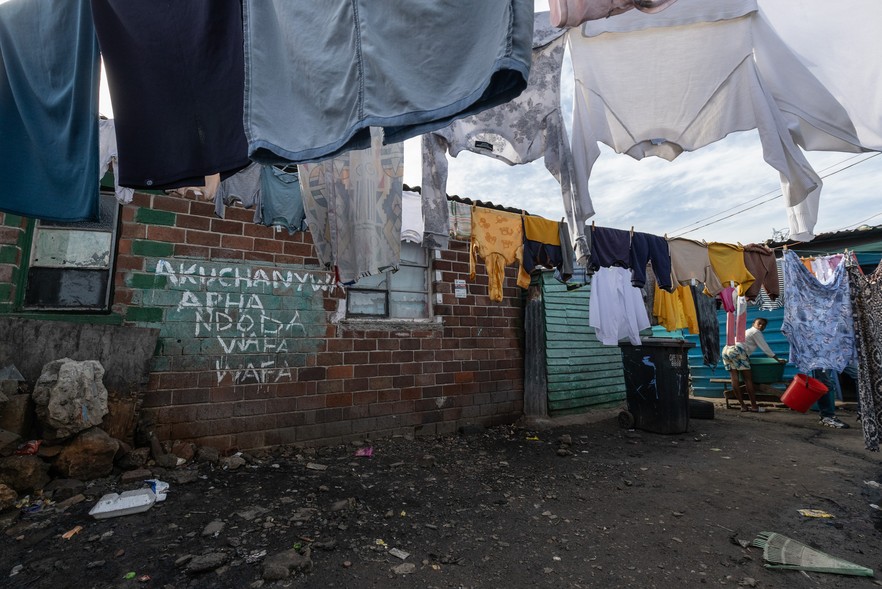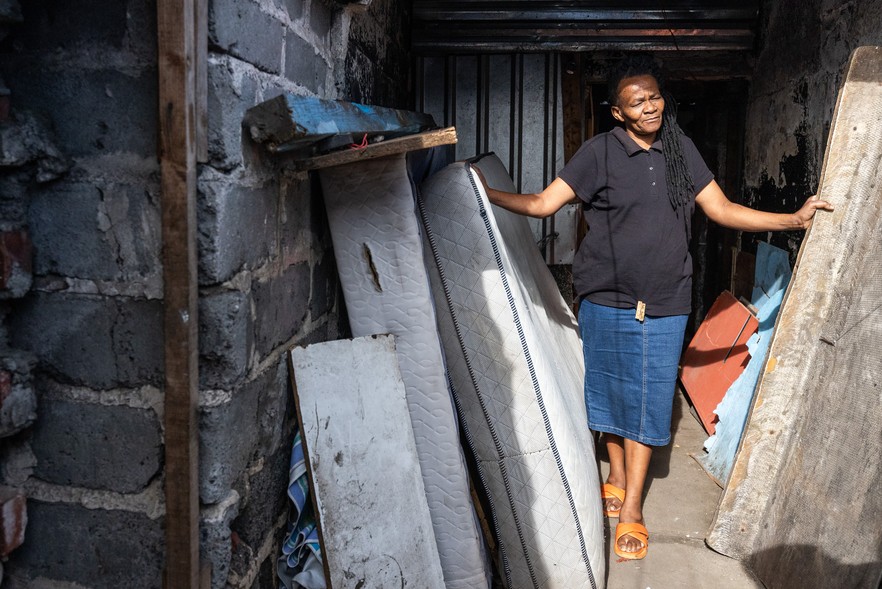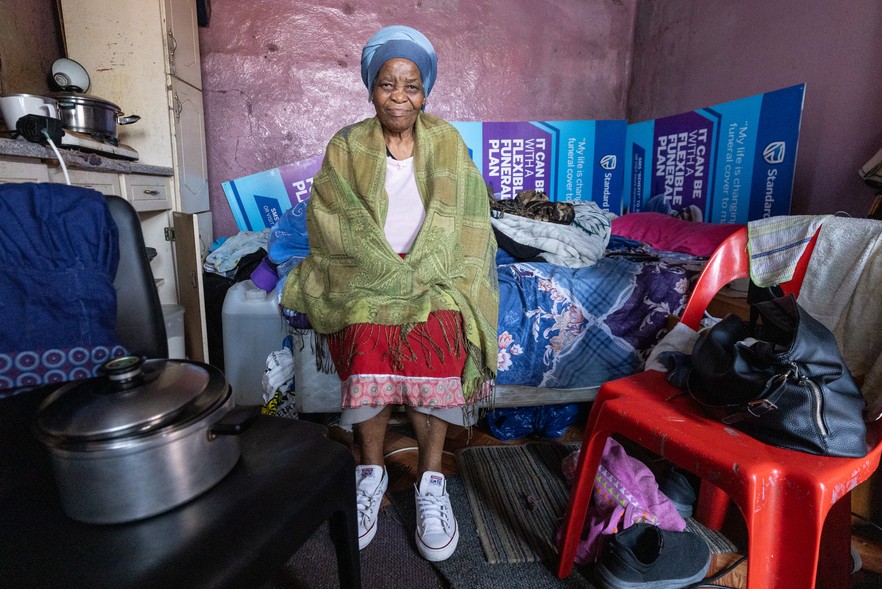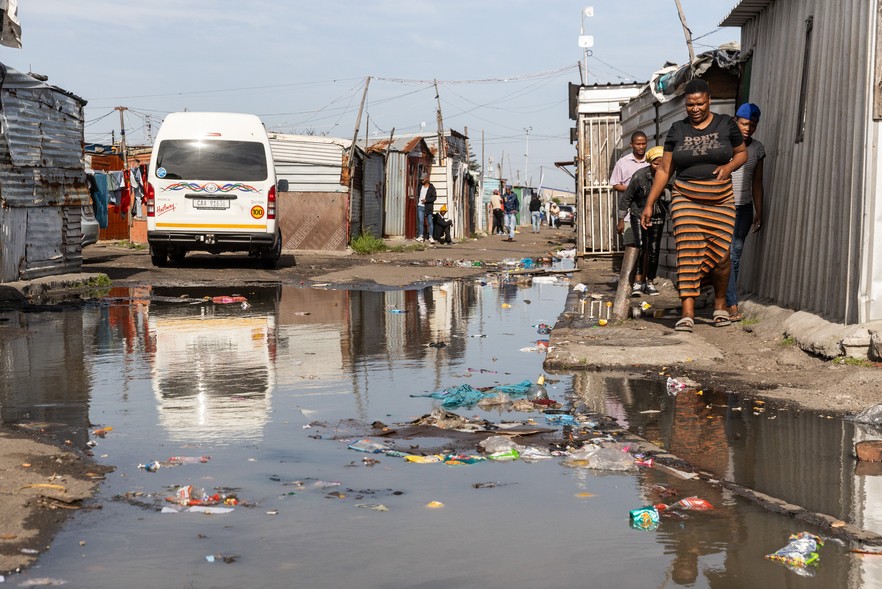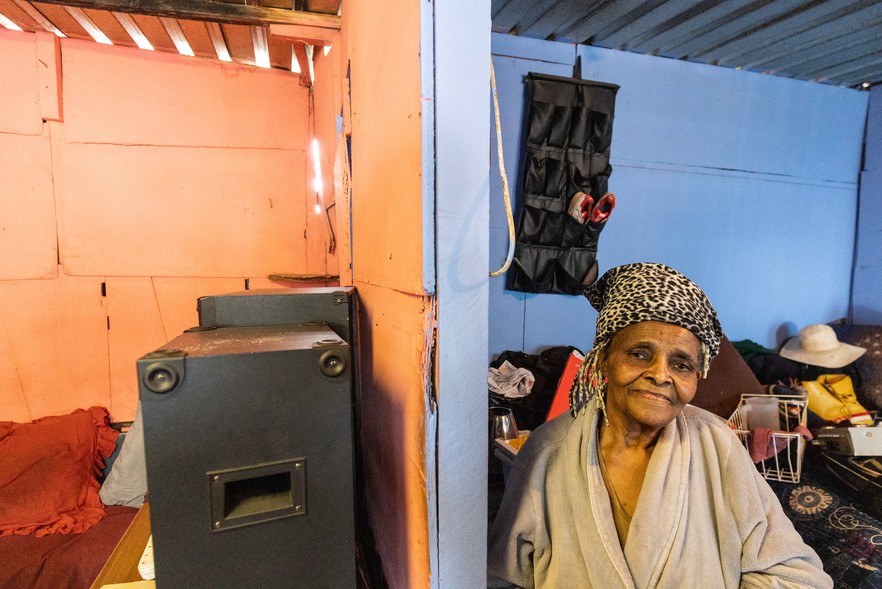In photos: one of the worst places to live in Cape Town
“Our parents lived in this poverty, we are living in this poverty, and now our children are living in this poverty”
Zone 17 in Langa has seen no development since democracy. Damaged by a fire in 2011, the hostels here are dilapidated. Residents have no toilets and have resorted to illegal connections for electricity. The sign on the wall says: “Do not piss here”.
- Residents of Langa’s “zones” still live in dilapidated hostels from the apartheid era.
- There has been no development in Zone 17 and residents live without formal electricity and use buckets as toilets.
- Some residents have been on the housing waiting list since the dawn of democracy.
- The City of Cape Town says it “is working on a Langa redevelopment plan” but shared no details.
“Our parents lived in this poverty. We are living in this poverty. And now our children are living in this poverty,” says Nomlibo Siko.
Siko is one of many people living in dilapidated hostels in Langa Zone 17. She has been here since 1993. She shares a small room with her three children. To free up space, she stores her mattress and bed base outside her room when they are not in use.
Siko showed us a red card she was given in 1997 when she applied for a house.
“Every time I enquire about my application I get the same response, that I am still on the housing database,” she said.
Nomlibo Siko with her mattress stored outside the room.
When we visited Zone 17, the streets had pools of grey stagnant water. Stormwater drains were blocked, and the pavements were littered with rubbish. Two large skips were piled high with garbage. Illegal electricity connections ran in all directions above one’s head.
Opposite Siko’s room, is the room of Nomfihlo Dyantyi, 84, who has lived here ever since she rented a bed at the hostel in 1974.
“I don’t know how for so many years we have managed to live like this. This is not how any person should be living. There is no electricity, no toilets, and as you can see this place is filthy. Our rooms leak and there is no space in them,” said Dyantyi.
She showed us a crumpled copy of her housing application from 1993. “I just want to show you that I have applied for a house. But look at me – I am old, I know I will leave this earth without ever getting a house,” she said.
Eighty-four-year-old Nomfihlo Dyantyi has been living in a room in a Zone 17 hostel since 1974. She has been on the housing waiting list since 1993.
The apartheid era Zones in Langa were numbered 17, 18, 19, 20, 23, 24, 25 and 26, and within these Zones were hostels, named Morris, Cape Foundry, Dura, Blue Line, Vineyard and Slingsby. Already in 1993, in her book, A Bed called Home, Mamphela Ramphele described the Zones as “by far the worst accommodation among the council-built hostels in Langa”.
“There are times when the rubbish is not collected, and you can imagine how much dirtier it gets when that happens,” said community leader Fundulwazi Langa.
“As the leadership of Langa, we have had numerous meetings with the community and with the City of Cape Town regarding the development of the Zones in Langa. To date, we have had two marches here, one in 2016 and the other last year in April, where we highlighted our grievances about the lack of housing and development in the Zones. We demanded that the City make the housing budget public as well.”
“Older people and people with disabilities live in these Zones. But some of the Zones like 17, have no toilets. How is that even possible in this day and age?” said Langa.
Community leaders in Langa say the Zones say the sewerage system is dysfunctional, creating pools of filthy, stagnant water.
Siko said they were relieving themselves in buckets and emptying these in the now blocked stormwater drain.
“Every time they [City officials] come to clean or fix the drains, they see shit because that is where we dump our shit. Sometimes this place even smells like shit, because we live in shit,” said Siko.
Asked a number of questions regarding development, upgrading plans and the lack of toilets in Zone 17, Mayco Member for Human Settlements, Carl Pophaim only said: “The City is working on a Langa redevelopment plan which includes the zones. Affected stakeholders are being engaged by the Directorate on a way forward on the redevelopment of Langa. Some services are being provided by Public Housing.”
Elizabeth Mqhingwana, 75, shares her small room with six family members, including an infant. Her knees are giving in and she has to limp around on crutches. She said she applied for a house many years ago, but lost her documents during a fire in 2011.
Support independent journalism
Donate using Payfast

Don't miss out on the latest news
We respect your privacy, and promise we won't spam you.
Next: News24 vs Sunday Independent: a look at the Press Ombud’s ruling
Previous: Judge Mngqibisa-Thusi cleared of gross misconduct charges
Letters
Dear Editor
In these times trying to keep our planet clean, one would not expect people in the Cape to live in squalor. It is their right to have dignity when living there in those conditions. What a shame.
Dear Editor
I think it is disgusting that our people must live like that when the politicians of our country line their own pockets with our tax money. Why are the people not being helped? This isn't right.
Politicians earn R100,000 per month. Why? They do not need so much money. Help our people - please!
Dear Editor
It is heartbreaking to see people living in these conditions... And on waiting lists for decades, but low income housing is made available to government employees who get housing subsidies and earn enough to buy property and are not even on waiting lists.
Dear Editor
I am beyond heartbroken to have read this article this morning. It is enough to lose complete faith in humanity. I find it impossible to accept that no plan to alleviate this appalling situation has not received the priority it deserves, especially taking into consideration the period of time the council has had to do something about it.
No human being or animal should have to live like this. It is a shameful and disgusting situation. I don't believe that intelligent people in the government and business can offer any excuse at all for not sorting this out. Please make this a priority as soon as possible. This is not what society can accept and live with.
Dear Editor
I cannot believe that Langa has grown by 500% during our democracy. If my memory serves correctly, the late 80s saw the appearance of shacks starting in Langa. A good many years later, Joe Slovo was built to accommodate these residents. Since then, the growth of even more shacks/informal settlements appeared. People just squat anywhere, in any minute open space irrespective of whether there is proper infrastructure like electricity, water and sanitation.
Firstly, where are these people coming from? Why are they "allowed" to do as they please? Hundreds of huge informal settlements have popped up all over the city for many years and it just keeps growing. Once these people are fully ensconced, they demand services.
A city is built on infrastructure and cannot just accommodate an exponential influx of people. I am and have been baffled by this influx of people to our city for a very long time now and would really like someone to try and explain this to me. How many of these people have jobs and are they contributing to our tax coffers and/or in any way positively contributing to our economy? How can their demands for basic services be met when the infrastructure is moot and cannot accommodate this growth in this specific space? I'm really struggling to understand all of it.
© 2024 GroundUp. This article is licensed under a Creative Commons Attribution-NoDerivatives 4.0 International License.
You may republish this article, so long as you credit the authors and GroundUp, and do not change the text. Please include a link back to the original article.
We put an invisible pixel in the article so that we can count traffic to republishers. All analytics tools are solely on our servers. We do not give our logs to any third party. Logs are deleted after two weeks. We do not use any IP address identifying information except to count regional traffic. We are solely interested in counting hits, not tracking users. If you republish, please do not delete the invisible pixel.

